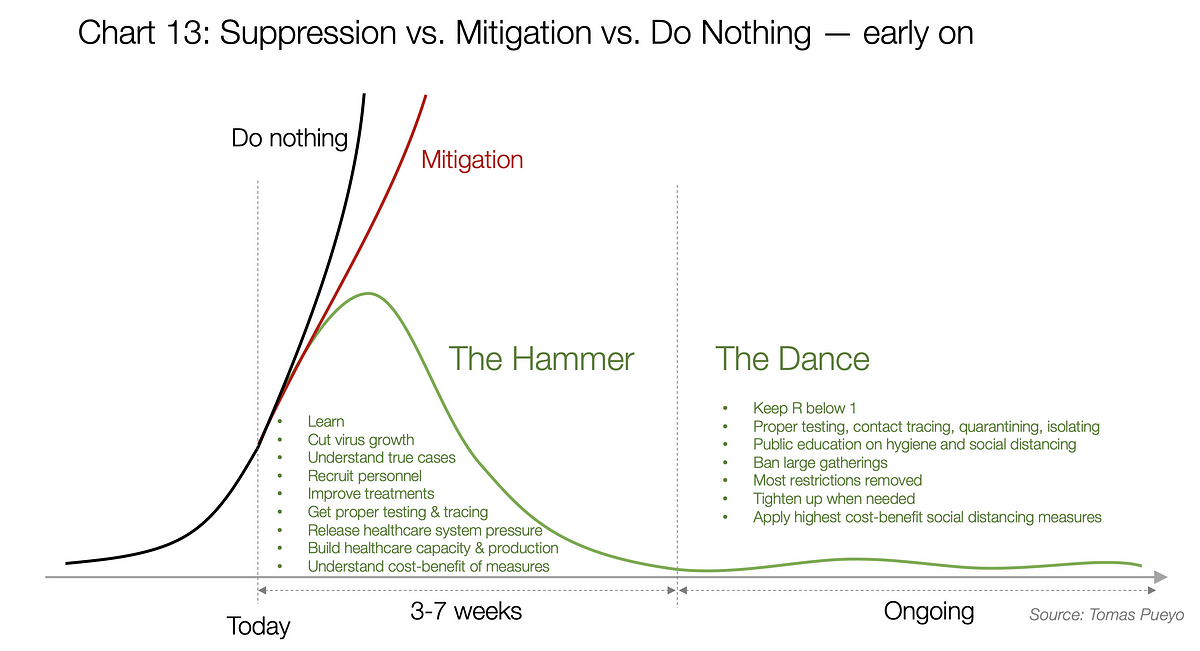Some interesting comments here.
The UK has gone further than I like in risk avoidance, e.g. companies not letting employees plug in a brand new phone charger until it's been PATT tested because they need to have paperwork showing they have done all they can to shield them from the risk of using it. (But of course if they take that - tiny - risk at home that's fine).
But I don't see the Covid response on the whole as being part of that though. I think the UK approach to risk is at the extreme end compared to most countries, yet we don't seem to be an outlier in terms of how we've handled lockdown. I don't think it came easily to this government at all.
What I think makes the risk aspects a bit different to normal is that at the moment the chances of someone becoming infected and developing symptoms* are fairly small. The social distancing requirements are intended to keep transmission down so that infections don't start increasing again, rather than (just) being about risk to the individual.
This means somewhat different criteria make sense. What would look like inconsistency if considering just individual risk makes more sense when you just want to keep R<1 and can afford to have some risky areas so long as there aren't too many (for example you might be able to have schools open and public transport back to normal, but not both).
And it's easy to point to the relatively low number of deaths compared to other causes and ask what all the fuss is about. But there is a very good chance that if we use that as an argument to stop social distancing and other precautions, that quite rapidly that number goes up again.
Some people seem to think the reduction in deaths (which is almost certainly due to the lockdown) show that it wasn't needed and I can't follow that logic. I also don't follow the argument that the lockdown has caused collatoral damage because of the impact on the NHS, as if without the lockdown the NHS would have been available for non-Covid related issues in a way it isn't now.
England seems to have abandonded the step-by-step approach to releasing lockdown and maybe in hindsight it will turn out to be the right one. I hope so.
If local lockdowns are going to be the plan from now on, it would be nice to see how the government intends to make them work and handle the economic aspects. I'm sure they have thought it all through.
* Modelling seems to suggest that under 20% of people becoming infected actually get a positive test - the majority of the rest presumably don't have symptoms that would qualify them for the test and likely don't get particularly ill at all.
The UK has gone further than I like in risk avoidance, e.g. companies not letting employees plug in a brand new phone charger until it's been PATT tested because they need to have paperwork showing they have done all they can to shield them from the risk of using it. (But of course if they take that - tiny - risk at home that's fine).
But I don't see the Covid response on the whole as being part of that though. I think the UK approach to risk is at the extreme end compared to most countries, yet we don't seem to be an outlier in terms of how we've handled lockdown. I don't think it came easily to this government at all.
What I think makes the risk aspects a bit different to normal is that at the moment the chances of someone becoming infected and developing symptoms* are fairly small. The social distancing requirements are intended to keep transmission down so that infections don't start increasing again, rather than (just) being about risk to the individual.
This means somewhat different criteria make sense. What would look like inconsistency if considering just individual risk makes more sense when you just want to keep R<1 and can afford to have some risky areas so long as there aren't too many (for example you might be able to have schools open and public transport back to normal, but not both).
And it's easy to point to the relatively low number of deaths compared to other causes and ask what all the fuss is about. But there is a very good chance that if we use that as an argument to stop social distancing and other precautions, that quite rapidly that number goes up again.
Some people seem to think the reduction in deaths (which is almost certainly due to the lockdown) show that it wasn't needed and I can't follow that logic. I also don't follow the argument that the lockdown has caused collatoral damage because of the impact on the NHS, as if without the lockdown the NHS would have been available for non-Covid related issues in a way it isn't now.
England seems to have abandonded the step-by-step approach to releasing lockdown and maybe in hindsight it will turn out to be the right one. I hope so.
If local lockdowns are going to be the plan from now on, it would be nice to see how the government intends to make them work and handle the economic aspects. I'm sure they have thought it all through.
* Modelling seems to suggest that under 20% of people becoming infected actually get a positive test - the majority of the rest presumably don't have symptoms that would qualify them for the test and likely don't get particularly ill at all.



